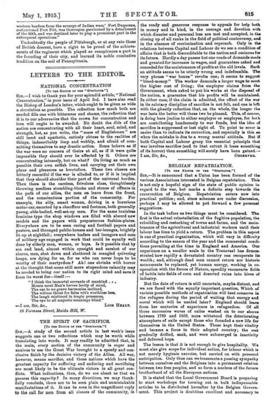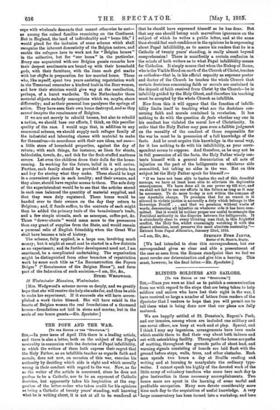BELGIAN REPATRIATION.
[To ens Enrron or nr. “Brecraroa."1
Sin,—It is announced that a Union has been formed of the various Associations interested in Belgian repatriation. This is not only a hopeful sign of the state of publio opinion in
regard to the war, but marks a definite step towards the resurrection of Belgium. Repatriation enters now into
practical polities ; and, since schemes are under discussion, perhaps I may be allowed to put forward a few personal suggestions.
In the task before us two things must be considered. The first is the actual reinstallation of the fugitive population, the rebuilding and restocking of towns and farms, and the main- tenance of the agricultural and industrial workers until their labour has time to yield a return. The problem in this eapeet is one of practical organization, which will vary in difficulty according to the season of the year and the eomnercial condi- tions prevailing at the time in England and America, Oar experience on a smaller scale in the Transvaal has demon.
strated how rapidly a devastated country can recuperate its wealth; and, although dead men cannot return nor historic,
monuments be replaced, yet human energy, working in co- operation with the forces of Nature, speedily reconverts fields of battle into fields of corn and deserted ruins into hives of industry.
But the date of return is still uncertain, maybe distant, and we are faced with the equally important question, Which of various possible methods of repatriation will best conserve is
the refugees during the period of waiting that energy and moral which will be needed later? England should learn
from her centuries of experience in refugeedom. Of all
those successive waves of exiles washed on to our shores between 1789 and 1869, none withstood the deteriorating atmosphere of exile except those who founded a new life for themselves in the United States. These kept their vitality and became a force in their adopted country; the rest gradually drifted, sank, and were submerged in inactivity and deferred hope.
The lesson is that it is not enough to give hospitality. We must also give scope for individual action, for labour which is
not merely hygienic exercise, but carried on with personal anticipation. Only thus can we transmute a passing sympathy between ourselves and the Belgians into a permanent relation between two free peoples, and so form a nucleus of the future brotherhood of all the European nations.
It is stated that the Local Government Board is preparing to start workshops for turning out in bulk indispensable articles to be distributed hereafter by the Belgian Govern- ment. This project is doubtless excellent and necessary to
cope with wholesale demands that cannot otherwise be met- es among the rained families remaining on the Continent. But in England, the land of individuality and "home life," I would plead for the inclusion of some scheme which shall recognize the inherent domesticity of the Belgian nature, and enable the refugees here to work not for "Belgian homes" in the collective, but for "our home" in the particular. Every one acquainted with our Belgian guests remarks bow their deepest sentiments are bound up with their household gods, with their furniture, with the linen each girl marks with her chiffre in preparation for her married home. Those who, like myself, spent two years assisting repatriation work in the Transvaal remember a kindred trait in the Boer women, and how their stoicism would give way at the recollection, perhaps, of a burnt wardrobe. To the Netherlander these material objects embody conceptions which we, maybe, share differently; and so their personal loss paralyses the springs of action. They have seen their own home destroyed, and so they cannot imagine the renaissance of Belgium.
If we are not merely to rebuild houses, but also to rebuild a nation, we should base our efforts, I think, on this peculiar quality of the race. I would urge that, in addition to any communal scheme, we should supply each refugee family of the industrial and labouring classes with material to make for themselves--in accordance with their own ideas, not ours— a little store of household properties, against the day of return; with such things, for instance, as linen for sheets, tablecloths, towels, &c., and tick for the flock-stuffed mattress covers. Let even the children dress their dolls for the home- coming. In working for the future, belief in it will revive. Further, each family should be provided with a private box and key for storing what they make. These should be kept in a convenient place in each locality; and their owners, and they alone, should have regular access to them. The sole duty of the superintendent would be to see that the articles stored in each case balanced the quantity of material supplied, and that they were duly registered. These boxes would be handed over to their owners on the day they return to Belgium ; and, if funds suffice, to the contents of each might then be added the primary tools of the breadwinner's trade, and a few simple utensils, such as saucepan, coffee-pot, &c. These "dower-chests" would mean more to the possessors than any grant of supplies from the State, and would remain a personal relic of English friendship when the Great War shall have become a tale of history.
The scheme, fully applied, is a large one, involving ranch money; but it might at small cost be started in a few districts is an experiment; and its farther development need not, I am convinced, be a complicated undertaking. The organization might be distinguished from other branches of repatriation work by some such title as "La Reconstruction des Foyers Beiges" ("Renaissance of the Belgian Home"), and form part of the federation of such societies—I am, Sir, Ise.,
ETHEL WEDGWOOD.
18 Westminster Mansions, Westminster.
[Mrs. Wedgwood's scheme moves us deeply, and we greatly hope that she will receive the help she asks for, and thus be able to make her experiment. If it succeeds she will have accom- plished a work thrice blessed. She will have relaid in the hearts of Belgian women the real foundations of a thousand homes—foundations not laid in atone and mortar, but in the souls of our brave guesta—ED. Spectator.]



































 Previous page
Previous page